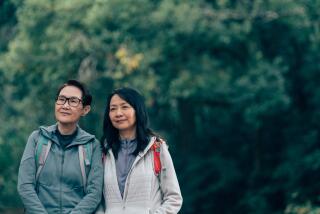MOVIE REVIEW : An Informative, Warm Look at ‘Forbidden Love’ in Canada
- Share via
Aerlyn Weissman and Lynne Fernie’s warm and informative documentary “Forbidden Love” (at the Nuart) introduces us to nine Canadian women who dared to fulfill their lives as lesbians in the homophobic ‘50s and ‘60s. Ranging in age from their 40s to early 70s, they are all blessed with hearty survivors’ humor.
Otherwise, they vary in appearance and race; several have children and have been married. What they have in common is their determination in seeking out the few lesbian-friendly bars and nightclubs, generally located in the Skid Row areas of Canada’s largest cities, which were the only places lesbians could gather and meet each other.
It’s quite clear early on that most of these women come from sufficiently conservative backgrounds to make us aware that had they not been lesbians they would not have ever ventured into such dicey districts, at once dangerous and exciting. Much of what the filmmakers document applies to the gay experience in the United States in the same decades, although in the ‘50s and even earlier at least New York’s Greenwich Village was hospitable to homosexuals.
The filmmakers’ point of departure, however, is not gay gathering spots but the lurid lesbian-themed paperbacks of the era, which the women tell us were their first connection with lesbian lifestyles; as such, they were cherished even though the mores of the times dictated unhappy endings. A key exception to the rule were the six paperback novels Ann Bannon wrote between 1957 and 1962; Bannon today tells the filmmakers that her publisher, Gold Crest, did not force the negative formula upon her but because she was then married with small children she finally felt forced to give up writing. Indeed, Weissman and Fernie effectively frame their interviews with a gentle tongue-in-cheek dramatization of a paperback lesbian novel from which their documentary derives its title.
Much of the interviews are given over to discussing first loves and the lively bar life, but there are inevitably frightening accounts of the brutal police raids that could strike the nightspots or even private parties at any time. The filmmakers, who intersperse their interviews with an apt and generous selection of archival footage, include a newsreel of such a raid. They also flash an array of vintage headlines, a reminder of just how ignorant and virulent institutionalized homophobia could be.
One of the key issues under discussion is the polarized roles lesbians, even more than gay males, were then expected to play. One woman after another attests that she was supposed to choose to be either a butch or a femme, and several speak of realizing that they found themselves straitjacketed into the very roles they were escaping when they left their husbands. A Canadian Indian and a black singer speak of the special difficulties of being double-minority individuals. The one crucial question the filmmakers inexplicably leave unasked is whether their interviewees, once past their first loves, ever managed to establish long-term relationships.
Upbeat, entertaining and good-natured, “Forbidden Love” (Times-rated Mature for adult issues) offers beyond the special challenges presented by homosexuality an affirmative portrait of women who found the courage to live their lives as they pleased.
More to Read
Only good movies
Get the Indie Focus newsletter, Mark Olsen's weekly guide to the world of cinema.
You may occasionally receive promotional content from the Los Angeles Times.










